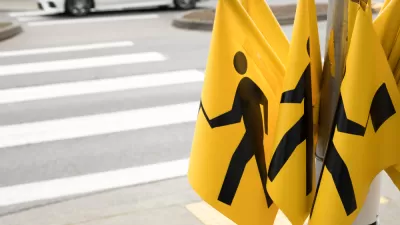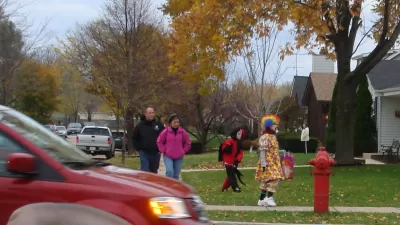The media coverage of a tragic crash in Cleveland shows how long of a leash drivers and street design get in the debate about traffic safety and the public realm.
"In downtown Cleveland Saturday night, a driver high on heroin struck and killed Jenasia Summers, 21, as she rode an electric scooter. But instead of questioning why Cleveland streets are so dangerous, the local press has responded by painting scooters as a safety hazard," writes Angie Schmitt.
Schmitt is criticizing the reporting and social media messaging of Cleveland.com, which, despite reporting in a separate article that the driver of the vehicle was on heroin, also tweeted a question about whether scooters are a cause for concern. An article earlier in the month describes the scooters as "incredibly dangerous," so there's a theme emerging in the publication's approach to electric scooters.
Schmitt is having none of it:
Scooters have been in the local headlines because the city recently told the start-up Bird to remove a fleet of 100 vehicles from public streets. Summers was not riding a Bird — she had rented an Icon scooter from a shop downtown. But whatever vehicle she was riding, it’s less relevant to this crash than Cleveland’s failure to make streets safer for walking, biking, or scooting.
The message echoes the tone of a previous article by Schmitt, which suggests that scooters are far more popular, and boring, than local media suggests. In that article, Schmitt also provides a level of nuance that's been rare in the discussion of electric scooters in that article: "Much of the scary news coverage has no doubt been motivated by fear of change — and, indeed, traveling by e-scooter in cities is a novel idea. In addition, the industry has been dominated by big tech firms who dump their products into public space first and ask for permission second (or not at all)."
FULL STORY: Scooters Aren’t a Public Safety Hazard. Dangerous Streets Designed Only for Cars Are.

Alabama: Trump Terminates Settlements for Black Communities Harmed By Raw Sewage
Trump deemed the landmark civil rights agreement “illegal DEI and environmental justice policy.”

Planetizen Federal Action Tracker
A weekly monitor of how Trump’s orders and actions are impacting planners and planning in America.

The 120 Year Old Tiny Home Villages That Sheltered San Francisco’s Earthquake Refugees
More than a century ago, San Francisco mobilized to house thousands of residents displaced by the 1906 earthquake. Could their strategy offer a model for the present?

In Both Crashes and Crime, Public Transportation is Far Safer than Driving
Contrary to popular assumptions, public transportation has far lower crash and crime rates than automobile travel. For safer communities, improve and encourage transit travel.

Report: Zoning Reforms Should Complement Nashville’s Ambitious Transit Plan
Without reform, restrictive zoning codes will limit the impact of the city’s planned transit expansion and could exclude some of the residents who depend on transit the most.

Judge Orders Release of Frozen IRA, IIJA Funding
The decision is a victory for environmental groups who charged that freezing funds for critical infrastructure and disaster response programs caused “real and irreparable harm” to communities.
Urban Design for Planners 1: Software Tools
This six-course series explores essential urban design concepts using open source software and equips planners with the tools they need to participate fully in the urban design process.
Planning for Universal Design
Learn the tools for implementing Universal Design in planning regulations.
Clanton & Associates, Inc.
Jessamine County Fiscal Court
Institute for Housing and Urban Development Studies (IHS)
City of Grandview
Harvard GSD Executive Education
Toledo-Lucas County Plan Commissions
Salt Lake City
NYU Wagner Graduate School of Public Service





























